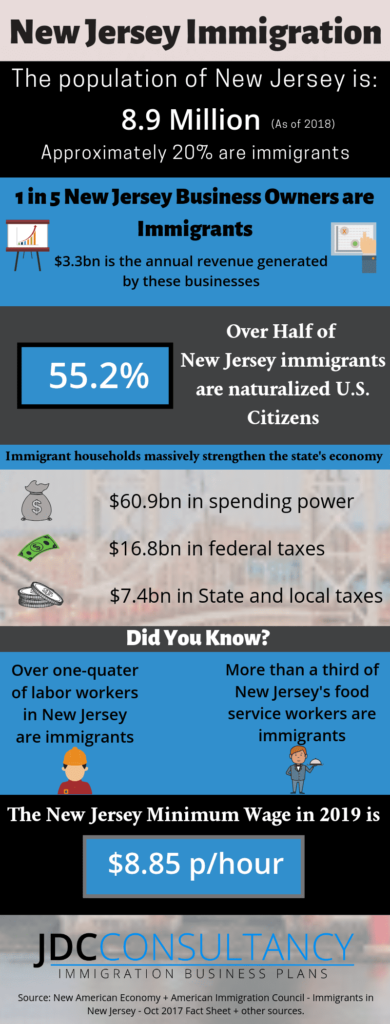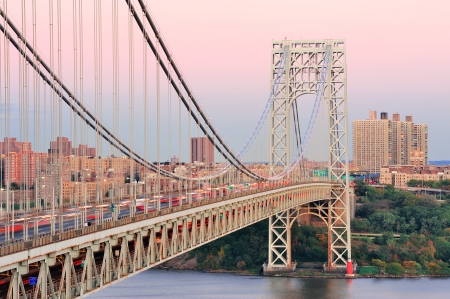In New Jersey, a state with a population of 8.9 million (as of 2018), the positive economic and social impact of immigrants cannot be ignored. The state is home to nearly 2 million immigrants, and its immigrant population increased by over 15% between 2005 and 2018. These immigrants comprise 20% (approx) of the state’s population, meaning that about 1 in 5 New Jersey residents are foreign-born, and these residents own about 29% of New Jersey’s businesses. The majority of immigrants in New Jersey are from India, the Dominican Republic, Mexico and the Philippines surpassing its previously most common immigrants, Italians. The number of immigrants in New Jersey is higher than the entire population of the state of Nebraska. Its Hispanic population has an especially significant economic impact in recent years.
New Jersey Immigrant Economic Contribution
 When it comes to enhancing and expanding the state’s economy, New Jersey’s Hispanic community holds considerable influence. Since 2018 New Jersey is one of only eleven states with a Hispanic population of over 15%. New Jersey’s immigrant population helps the State’s economy tremendously via taxes, covering federal and state services that benefit communities everywhere. Annually Immigrants in New Jersey pay approximately $16.8bn in federal taxes, $7.4bn in state and local taxes and $60.9bn in spending power further enhancing the economy as a whole. Between 1990 and 2012, Latino purchasing power in the state rose by 389% to over $44 billion, while Asian purchasing power rose by about 687%.
When it comes to enhancing and expanding the state’s economy, New Jersey’s Hispanic community holds considerable influence. Since 2018 New Jersey is one of only eleven states with a Hispanic population of over 15%. New Jersey’s immigrant population helps the State’s economy tremendously via taxes, covering federal and state services that benefit communities everywhere. Annually Immigrants in New Jersey pay approximately $16.8bn in federal taxes, $7.4bn in state and local taxes and $60.9bn in spending power further enhancing the economy as a whole. Between 1990 and 2012, Latino purchasing power in the state rose by 389% to over $44 billion, while Asian purchasing power rose by about 687%.
Immigrants in New Jersey are especially influential in the rapidly expanding STEM fields. Jobs in STEM are increasing significantly faster than the rest of the economy, presenting massive opportunities for immigrant entrepreneurs, who are more likely to hold advanced degrees than U.S. born residents. As of 2017, around 68% of STEM Master’s and 54% of Doctoral candidates were immigrants. These graduates go on to create a wealth of jobs in innovative technology, the state’s fastest-growing field. New Jersey immigrant entrepreneurs create more high-tech start-ups than in any other state, with over 40% of companies in this category being created by immigrants.
Through the very nature of the difficult act of immigration, immigrants are more likely to become entrepreneurs and create companies that employ anywhere from a few to thousands of Americans. New Jersey has the fourth-highest number of immigrant-owned businesses in the United States, and these businesses generate over $6.2 billion each year. Immigrants have a long history of job creation in New Jersey, and prominent companies Merck, Cognizant Technology Solutions, Honeywell, and Goya Foods, which were founded by immigrants or their children, provide over 375,000 jobs and earn about $92.4 billion annually.
New Jersey immigrants also succeed in medical fields, which are increasingly understaffed. As of 2018, 30.3% of Nurses and 45.7% of Aides working in the State were foreign-born. Immigrants have already been filling some of America’s most glaring healthcare needs. Immigrants and foreign-born nationals are twice as likely as US-born to work as home health aides, but also twice as likely to be physicians and surgeons. New Jersey recognizes the value that its immigrants bring to the community.
Newark Overview
With a population of about 278,427 in 2013, Newark is the most heavily-populated city in New Jersey, and is a national hub for shipping, air, and rail transportation. Newark is part of the New York Metropolitan area, and is about eight miles west of lower Manhattan, meaning that it benefits economically from New York’s burgeoning success as well as New Jersey’s. Newark was founded in 1666, making it one of the oldest European-founded cities in the United States.
Newark Economy
Newark continues to be a vital part of shipping and transport. Port Newark-Elizabeth is the main shipping terminal of the Port of New York and New Jersey, which is the busiest seaport on the east coast. The city is also home to the nation’s first municipal commercial airport, Newark Liberty International Airport, which is still one of the most active airports today. This proximity to shipment by air and sea makes Newark a strategic location for immigrant entrepreneurs who need to import or export goods.
Newark is home to numerous prominent companies in a variety of industries, including Panasonic, Audible.com, Prudential, and more. It is an education hub for the area, and hosts Rutgers University, which houses the world-famous Rutgers Institute of Jazz Studies, as well as a law and medical school. It is also a cultural center, and hosts numerous concert venues, stadiums, community centers, convention halls, and museums, like the Newark Museum.
Each day, over 100,000 people commute to Newark for work, and it is the largest center for white collar jobs, like finance, import-export, government, and insurance in the area. Due to the city’s number of universities, over 50,000 college students also call the city home. It is also home to five hospitals, which provide employment opportunities for the aforementioned immigrants who hold medical degrees. Newark’s proximity to Manhattan, as well as its exceptional transport links make it an excellent choice for immigrant entrepreneurs in most industries to consider.
What is the Minimum Wage in New Jersey?
 As of 2019, the state of New Jersey’s minimum wage is $8.85 per hour, this is $1.60 higher than the Federal Minimum Wage of $7.25. The States agreed to increase the minimum wage occurred in 2008 and since then has been annually reviewed and increased if deemed appropriate. The minimum wage applies to most of the state’s employees, the limited exceptions to this include tipped employees if working in the hospitality industry and some student workers.
As of 2019, the state of New Jersey’s minimum wage is $8.85 per hour, this is $1.60 higher than the Federal Minimum Wage of $7.25. The States agreed to increase the minimum wage occurred in 2008 and since then has been annually reviewed and increased if deemed appropriate. The minimum wage applies to most of the state’s employees, the limited exceptions to this include tipped employees if working in the hospitality industry and some student workers.
The State’s minimum wage was last changed in 2008 when it was raised $1.70 from $7.15 to $8.85. New Jersey’s minimum wage rate is linked to and measured by the Consumer Price Index, which is intended to raise the rate along with inflation and cost of living in the State. The current minimum wage rate is updated annually based on these values.
New Jersey 2019 Minimum Wage Breakdown
1. New Jersey Under 20 minimum wage
Federal law allows any employer in New Jersey to pay a new employee who is under 20 years of age a training wage of $4.25 per hour for the first 90 days of employment.
2. New Jersey tipped minimum wage
Employees who earn a certain number of tips every month may be paid a lower minimum wage but must earn at least $8.85 including tips every hour.
3. New Jersey student minimum wage
Full-time high school or college students who work part-time may be paid 85% of the New Jersey minimum wage which could amount to as little as $7.52 per hour for up to 20 hours of work per week with certain employers.
4. New Jersey regular employee minimum wage
The current minimum wage in New Jersey is $8.85 per hour as of January 1, 2019.
Support for New Jersey Immigrants
New Jersey fully appreciates the contributions, both economic and social, that immigrants bring to the table. The state hosts the annual NJ Immigrant Award Program, which honors first-generation immigrant entrepreneurs for their innovations and enrichment of their communities. This program is supported by 17 advocacy organizations, business groups, and chambers of commerce.
 Immigrant entrepreneurs will also soon have access to the Success Center, hosted by the New Jersey State Library. This organization will seek to connect immigrant entrepreneurs with the technology, information, and people that their businesses will require to succeed in the New Jersey marketplace. It also aims to offer meeting rooms and other facilities where immigrant entrepreneurs can innovate, organize, and meet with investors as necessary.
Immigrant entrepreneurs will also soon have access to the Success Center, hosted by the New Jersey State Library. This organization will seek to connect immigrant entrepreneurs with the technology, information, and people that their businesses will require to succeed in the New Jersey marketplace. It also aims to offer meeting rooms and other facilities where immigrant entrepreneurs can innovate, organize, and meet with investors as necessary.
New Jersey, as a whole, is dedicated to the success of its immigrant entrepreneurs, because it recognizes that when they succeed, the entire state economy grows and thrives. For immigrant entrepreneurs looking to enter the STEM, medical, or import-export fields, New Jersey presents a wealth of opportunities and potential for long-term success.
About the JDC Consultancy U.S. State Featurettes
Moving to the United States to make a new start as a foreign entrepreneur is a challenging process. U.S. visa applicants face a huge number of critical decisions before submitting their visa application, one of the most important of which is deciding which State will offer the best environment for their business to grow and thrive, and provide the optimal environment for their families. Each State has its own opportunities and industry specializations, and a company that sees tremendous growth in one State might not see the same results in another.
To help its clients decide which State will serve as the most advantageous home base, both for their businesses and their families, and further streamline the visa application process, JDC Consultancy publishes brief overviews of what each State has to offer its immigrant entrepreneurs. These featurettes showcase each State’s strengths, in this case, New Jersey, and provide valuable insight and statistics to help immigrant entrepreneurs make the all-important decision of which State they, and their businesses, should call home.

